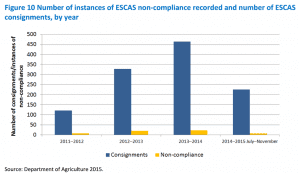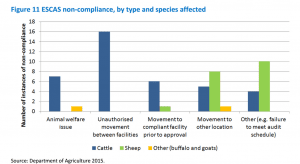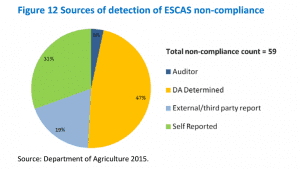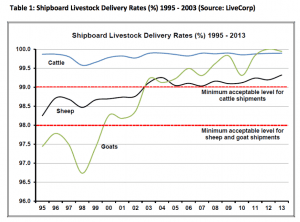A comprehensive review by the Federal Government has found that Australia’s three-year-old system for assuring the welfare of livestock exported to foreign markets has been a strong success.
The findings contrast with persistent negative media coverage of welfare standards within the livestock export trade initiated by the repeated complaints of animal welfare and animal rights groups.
The long running review by the Department of Agriculture of the Exporter Supply Chain Assurance System (ESCAS) found that that the mandatory system is delivering positive through-chain welfare outcomes for the vast majority of livestock exported from Australia.
Introduced by the Gillard Government in 2011 in the wake of live export ban to Indonesia, ESCAS took the unprecedented step of making Australian exporters legally responsible for all animals they sell in foreign markets right through to the point of slaughter.
The system also requires the round-the-clock traceability of all exported animals, training for staff who handle Australian stock, constant reporting of compliance levels by importers and the delivery of stock only to Australian Government approved and independently audited supply chains.
Key findings of the DoA’s ESCAS review included:
- More than 99pc of livestock exported have experienced a positive welfare outcome since ESCAS was introduced in 2011;
- The high rate of compliance with international animal welfare standards covers more than eight million exported animals to over 860 facilities across 18 countries;
- In nine of Australia’s livestock export markets there were no incidents that impacted animal welfare, while in the other nine markets the incidents involved between an estimated 0.002 and 1.58 per cent of the animals Australia exported to those markets;
- The report shows that since the ESCAS system was introduced, 8,035,633 livestock were exported with 12,958 animals – or 0.16pc of all exported animals – experiencing a potentially adverse animal welfare outcome;
- More than 7,000 people have been trained in animal handling and husbandry skills in destination markets under ESCAS.
The report also highlights further opportunities for reform of ESCAS to simplify administrative processes and reduce cost burdens while still meeting the essential welfare objectives of the ESCAS system. These include:
- clearer guidelines for describing and managing non-compliance, and clarifying third party complaint processes;
- allowing the sharing of audits for the same facilities or supply chains, which will remove duplication, reduce costs and improve opportunities for co-operation between individual exporters;
- encouraging opportunities for industry to take greater responsibility for proactively managing the risks within supply chains, and supporting industry development of an assurance system as recommended by the Farmer Review. ESCAS could potentially be broadened to allow for comprehensive company or industry assurance systems operating within an appropriate statutory framework.
Minister for Agriculture, Barnaby Joyce, said Australia has now been established as a clear world leader in the welfare of exported live animals.
“These are very strong results that show that the system is working.
“However, everyone would agree that improving animal welfare outcomes continues to be a challenge.
Recommendations from this report will support continual animal welfare improvement in our live export industries,” Minister Joyce said.
“What this review clearly demonstrates is that Australian livestock exported overseas are treated humanely in almost every instance and in accordance with international animal welfare standards.
“With that in mind, critics of the live export trade should end irrational and misleading attacks on importing countries that welcome Australian cattle and sheep, and who rely on Australia as an important source of high quality, reliable and safe protein.
“Let’s not forget that livestock exports have earned more than $1.4 billion in the 16 months since we have come to office, and provide an absolutely vital market for Australian cattle and sheep producers.
“This industry is directly improving returns at the farmgate through increased domestic competition – indeed the record prices we are seeing in saleyards across the country right now can at least in part be attributed to the strong demand from our live export markets.
“As we head toward our target of $3 a kilo in the yards, a price that brings a return never seen in money terms in the history of Australia, and terms of trade that hasn’t been seen since the 70’s we must remember that this turnaround has not happened by accident. The reinvigoration of live animal export has been vital to bring real competition back to the saleyards and paddocks and a real return to farming families of the nation.
“From Darwin to Mt Gambier better returns are being delivered by this Coalition Government and in so doing assisting our nation towards balancing the books. Continually in this process we have been attacked by those who wish to once more cease the live trade and reduce returns to producers almost as if they want farmers to be poor. The argument has been that they believe that ESCAS has been ineffectual. This review shows in fact that it has been effective.
“We also know that the system is improving welfare outcomes well beyond our shores and well beyond Australian animals.
The report finds that Australia’s high standards of animal welfare in the live export industry and strong levels of industry compliance currently cost government and industry $17.6 million every year.
“The Australian Government made a commitment to reduce red tape for primary producers. Now that we know that the ESCAS system is effective, the government will work to ensure it is delivered as efficiently as possible,” Minister Joyce said.
“Based on the recommendations from this report, we will examine opportunities to implement clearer compliance guidelines, remove duplication of audit activities and introduce greater industry responsibility for risk management.”
“The Coalition Government is fully committed to the trade and I am proud of the fact that since we have been in office we have opened six new markets for live cattle and sheep – Egypt, Bahrain, Iran, Cambodia, Thailand and Lebanon – and we are intent on continuing that trend.”
The Exporter Supply Chain Assurance System Report delivers the government’s commitment to review the ESCAS system. The report contains data for all animals exported under ESCAS from August 2011 to November 2014.
The report was developed taking into account submissions from industry bodies, exporters, animal welfare organisations, state and territory governments and importing country governments to identify key areas for long-term improvement.
The full report is available online: http://www.agriculture.gov.au/escas-report.
Australian Livestock Exporters’ Council: Huge inroads into improving welfare
The Australian Livestock Exporters’ Council (ALEC) has welcomed today’s report into the Exporter Supply Chain Assurance System (ESCAS) which found that the implementation of ESCAS coupled with exporter and customer targeted training in handling, husbandry and slaughter practices and infrastructure investment in feedlots and abattoirs has delivered significant improvements to the welfare of Australian exported livestock and local livestock in export markets.
Chairman of ALEC, Simon Crean said that in the just the two years of full ESCAS application the Australian livestock export trade has made huge inroads into improving animal welfare outcomes and placed the trade on a stronger footing to support its ongoing vital economic and job sustaining role in regional Australia.
“In 2011, the industry was in a difficult and dark place and facing its greatest challenge yet. The implementation of ESCAS – a world first attempt to manage the welfare of exported livestock along supply chains beyond our borders where significant welfare issues had been identified – was a bold move by the then Government and an incredible test of live exporters relationship with downstream customers”, Mr Crean said.
“But with the support of successive governments, the tenacity and commitment of exporters, the resource support of LiveCorp and Meat and Livestock Australia and the willingness of our customers and their staff to work with us, vastly improved treatment of Australian livestock overseas has been achieved and a steady course for further positive change has been established.
“That’s not to say that in getting to where we are today, we have not had our challenges along the way. As the report acknowledges there have still been mistreatment of livestock in the years under ESCAS – 22 incidents in total – that do not reflect well on the industry.
“But not only are these incidents much fewer under ESCAS, as an industry now, we look more harshly and critically on our failings, self-report them when they occur and work to treat the problems at the source as we strive for continuous improvement to be the best version of a live export industry we can be.
“A key to the improvements has been the millions invested in new and improved infrastructure and the training of over 7500 workers who have daily charge of Australian livestock in feedlots and abattoirs in over 19 countries around the world. Additionally, implementing processes like carcase only sales has enabled us to marry animal welfare, religious practices and commerce.
“Industry’s efforts have already been recognised by the OIE – the pre-eminent international animal health and welfare body.
“At the LIVEXchange Conference in October 2013 the Head of OIE’s International Trade section, Derek Belton said that the Australian live trade is leading the world in animal welfare and that industry’s investments in improving implementation of OIE welfare standards has its full and unequivocal support.
The Chief Executive Officer of ALEC, Alison Penfold said that exporters welcomed the report’s support for further reform of ESCAS.
“The Australian livestock export trade is not an industry that ever stands still so we welcome the Government’s commitment to pursue further improvements to ESCAS to remove unnecessary red tape and reduce the cost of its’ bureaucracy and build on the regulatory changes already made”, Ms Penfold said.
“If we are to remain internationally competitive in a robust global live trade environment and continue to provide the market alternatives for Australian cattle, buffalo, sheep and goat producers, we must have a regulatory structure that facilitates trade and helps us grow our influence across the globe.
“As the report highlights, paper bureaucracy is excessive and aspects of the system focus too much on process rather than on outcomes. This just adds up to excessive costs on industry without any welfare gain.
“The maturity of the Government’s approach to reform is a strong signal to industry that the Government is genuinely interested in recalibrating ESCAS and exploring the role of an industry through-chain assurance system to reduce cost and red tape while maintaining welfare safeguards – something we enthusiastically embrace.”
Sources: Federal Minister for Agriculture, Australian Livestock Exporters’ Council







HAVE YOUR SAY